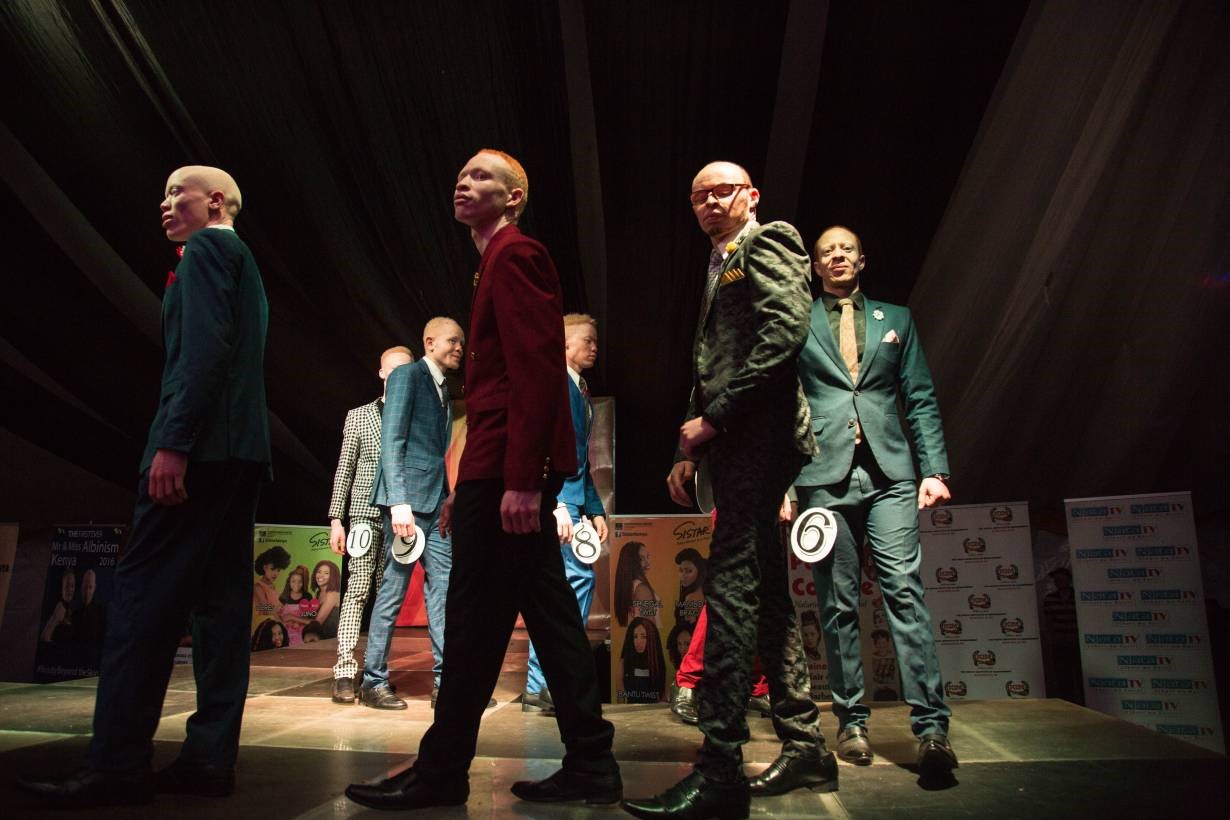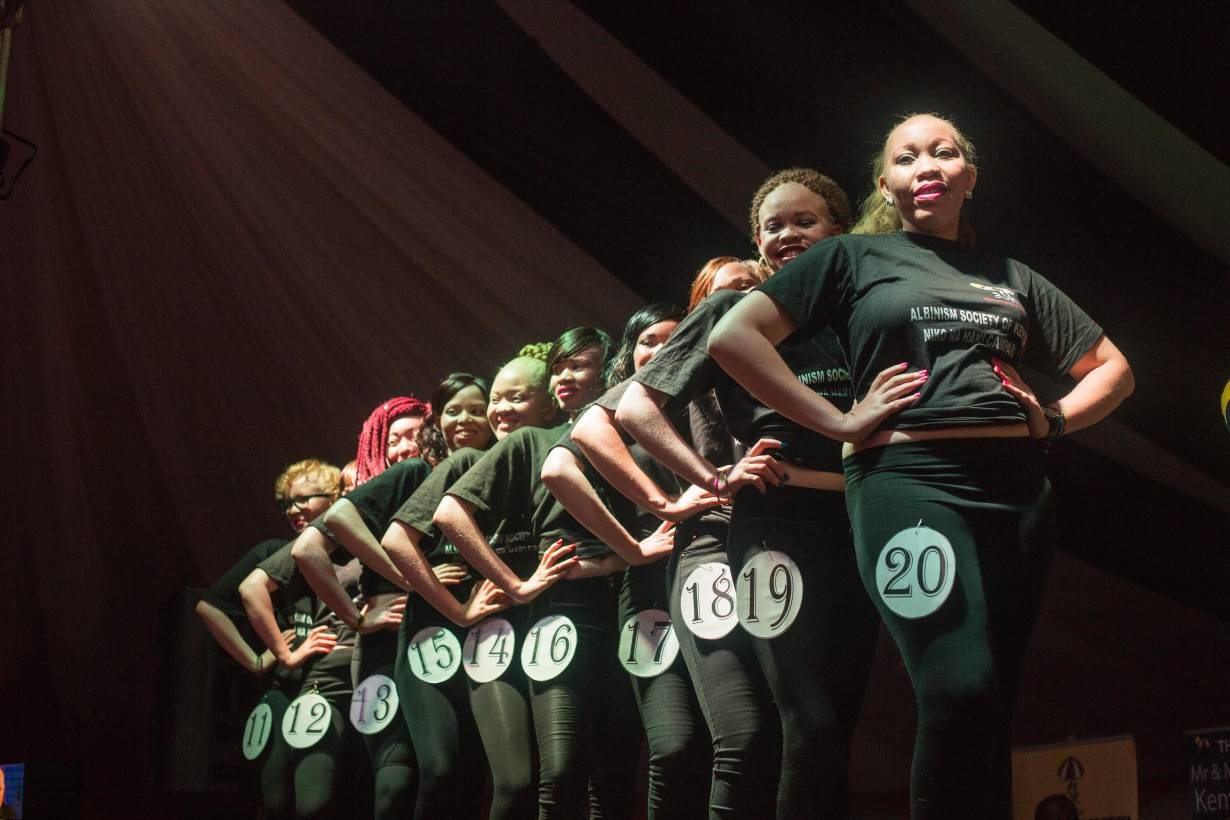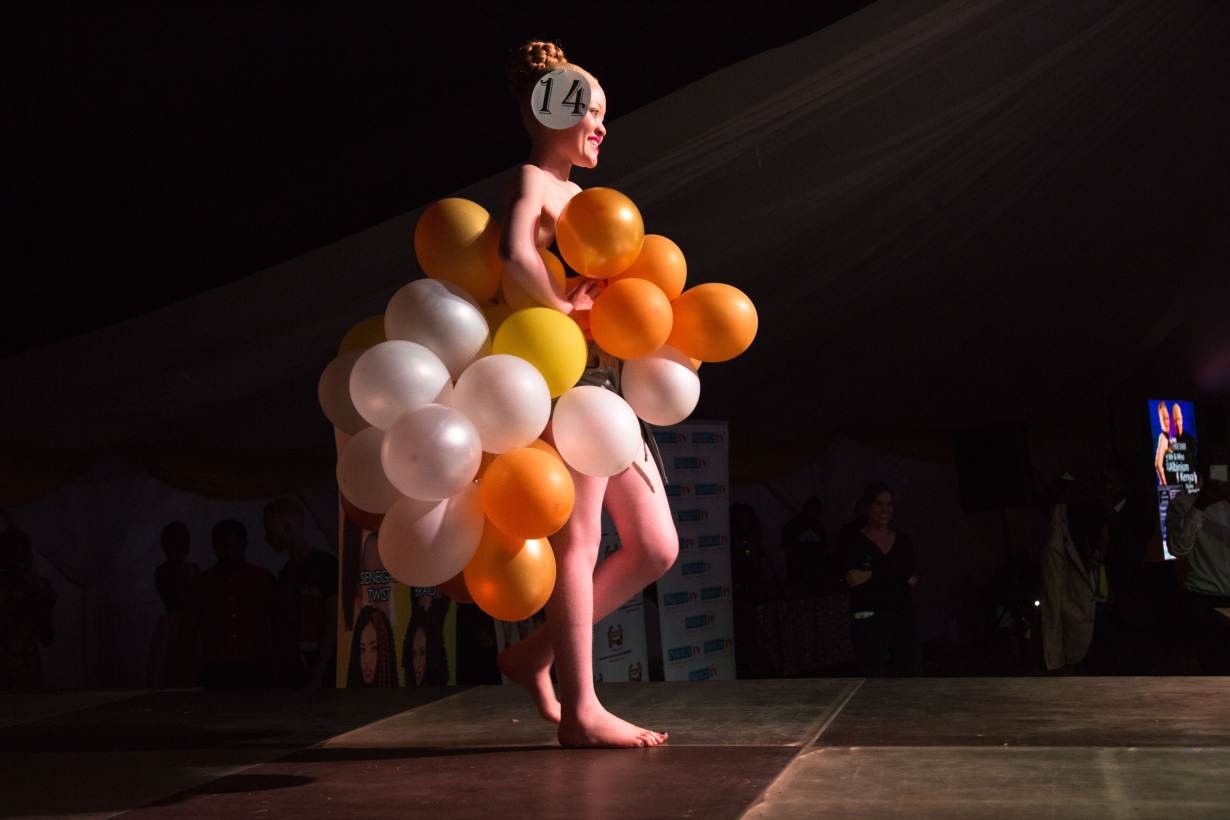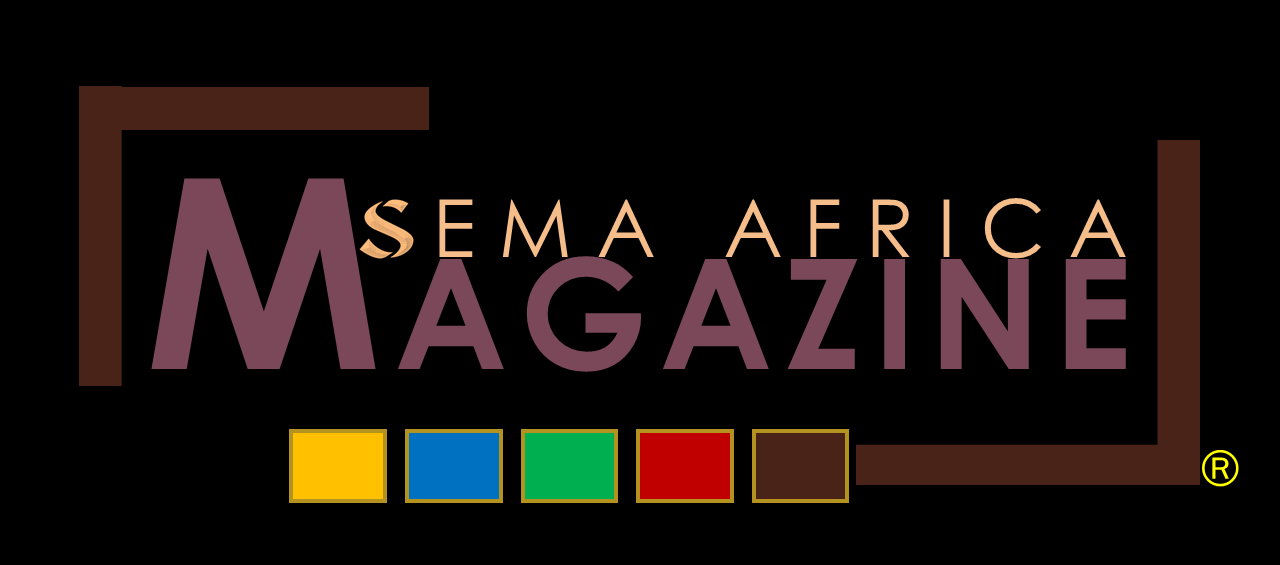World's first
albino beauty pageant in Kenya defies deadly
stigma

Competitors showcase their dapper suits, during the evening wear section of the Mr and Miss Albinism Kenya pageant in Nairobi in October. Thomson Reuters Foundation/Amanda Fisher
People with albinism are frequently shunned, attacked and even killed across Africa.
With its evening gowns, celebrity judges and tears of joy, the beauty pageant in Kenya's capital was like others elsewhere, except for one thing - all 20 contestants who strutted, sashayed and swaggered down the catwalk had albinism.
In the world's first contest of
its kind, 10 men and 10 women competed in the Mr and Miss Albinism
Kenya pageant in Nairobi.
Its motto was "Beauty Beyond the Skin".
The competition, which drew a crowd of about 1,000 including Deputy President William Ruto, was designed to celebrate people with albinism - who lack pigment in their skin, hair and eyes - and challenge stigma and persecution.
"Even when I was dating, it was difficult for girls to say I'm handsome," said Isaac Mwaura, Kenya's first parliamentarian with albinism and founder of the Albinism Society of Kenya, which organised the pageant.
"I knew I was handsome (but)
people with albinism are seen as not beautiful, as not
good-looking, and that has an effect on their self esteem," he
said.
People with albinism are frequently shunned, attacked and even killed across Africa. In many countries, their body parts are believed to bring wealth and good luck and are prized in witchcraft for use in charms and magical potions.
Witch doctors are willing to pay as much as $75,000 for a full set of albino limbs for use in black magic, according to the Red Cross.
Attacks on albinos in Africa rose at the end of last year, linked to a growing demand from political hopefuls seeking good fortune in the run-up to elections in several countries, according to the U.N.'s first human rights expert on albinism.
Mwaura said albinism is seen as a curse in Kenya and all contestants have been taunted and called "zeru", which means "ghost", or "pesa", a Swahili word for money, in reference to the value of their body parts.
"Our girls are not getting married," Mwaura said. "They are beautiful women, and you find people don't want to walk around town with them, so we thought, 'Let's use this opportunity to confront stigma and discrimination.'"

Female competitors line up on stage at the beginning round of the Mr and Miss Albinism Kenya pageant in Nairobi in October. Thomson Reuters Foundation/Amanda Fisher
GLITTER AND TEARS
Like the other contestants, 19-year-old Lucianah Nyawira took part in a week-long boot camp to get ready for the competition. There they practised poses and got preened and plucked into shape.
With high cheekbones, pouty lips and blue doe eyes, the pageant's youngest contestant had been modelling for the past two years, while studying international relations in Nairobi.
The girl from the rural county of Kirinyaga recently landed a six-month contract in Paris that she will take up in January.
But success abroad doesn't match her treatment at home.
"Recently the judges told me, 'You can never be a model,'" she said. "We just want dark-skinned models.' They told me I'm wasting their time and my time so I should just pack my things and go."
Nyawira said rejection began with her first breath. When her father saw his wife had given birth to an ostensibly white baby, he kicked them out, imagining his daughter was the product of an affair with a "mzungu" - a white foreigner.
"I feel if I have the crown people will listen to me," she said before the final judging. "If I have the crown, I can go to my governor and tell him, 'I'm Miss Albinism Kenya,' and ask him questions: 'What are you doing for people with albinism in this county?'"
In the end, Nyawira didn't win.
"I'll just concentrate on high fashion from now," she said, her face stained with tears and glitter.

Lucy Nyawira sashays down the catwalk in a costume she made out of balloons, during the 'creative wear' round of the Mr and Miss Albinism Kenya pageant in Nairobi in October. Thomson Reuters Foundation/Amanda Fisher
DREAM COME TRUE
At 28, the contest's oldest male competitor, John Ngatia, has a boyish charm and a refusal to acknowledge limitations.
Married with a five-month-old son, Ngatia has achieved something that eludes many Kenyans - he has a permanent job, working for Kenya's Water Resource Management Authority.
But he said the beauty pageant brought to life something he had long yearned for.
"This is my dream come true. Now I feel like a professional model. I can even teach people how to catwalk."
Ngatia said his successes in life had a lot to do with attitude.
"I do anything (others) are doing. Sometimes I even forget I'm a person with albinism, unless a person starts reacting differently. That's when I remember, 'Oh, I'm different.'"
After the pageant, Ngatia was upbeat about taking the first runner-up position and magnanimous in defeat.
"I feel nice, even though I didn't get Mr Albinism - I don't have any grudge with my friend (winner Jairus Ongetta). I'm making jokes with him."
Pageant organiser Mwaura wasn't worried the event risked damaging already delicate self-esteem.
"They're competing amongst themselves so there's no room for somebody to say, 'I was discriminated against."
He said he had high hopes for the pageant's future, including producing a Miss Kenya with albinism. He also wants to make the pageant pan-African, and eventually global.
"We need to actually tell our story from our point of view because most of the time when our story is told by other people they say it from a point of pity. We want to show that, yes, there's a positive side to albinism."
Story first reported by Thomson Reuters Foundation, the charitable arm of Thomson Reuters.

YOUR SHOPPING MADE EASY
Africa's Change Makers Magazine
COMPANY
AFRICAN ACHIEVERS INTERNATIONAL Inc. is a global media and technology company including lifestyle media publisher SEMA AFRICA
online
Magazine AFRICAN ACHIEVERS MAGAZINE, digital shopping
platform PA-BEAUTY STATION.COM, event management
PRIDE OF AFRICA, awards program AfIA
AWARDS, youth and talent development, PILLARS OF
HOPE and AAK, Volunteerism
UNIVERSIDAY grassroots community support
NAD and financial support
REMITGROW and monthly subscription box AAi Must
Have. ....
More from African Achievers International
PLATFORM
About Sema
Africa
Our
Team
Contact
Us
Jobs
Internship
Upcoming Events
Get a Domain/Website
Mama Africa - My Story
Write for Sema Africa
Advertise
Promote your Events
Travel
Policies
Archive
SUBSCRIBE






